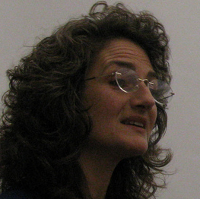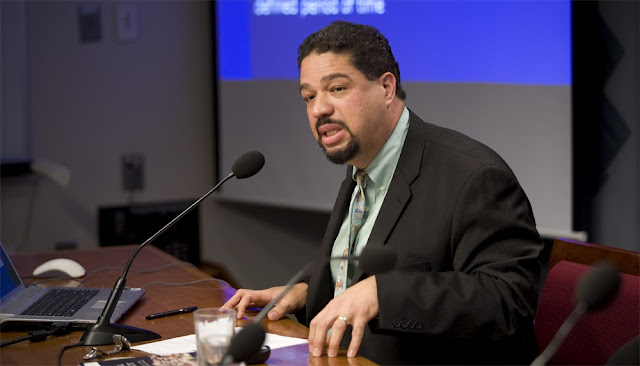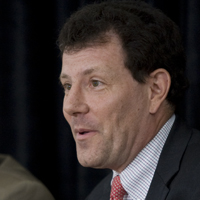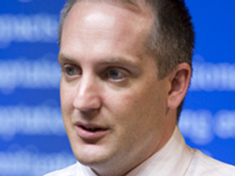-
Friday Podcasts
Barbara Crossette on UNFPA State of the World Population 2010 Report
MORE “Particularly when you go into a society that’s been broken by war or conflict or is so impoverished that is has nowhere to start climbing up, there have to be integrated programs and they have to work with people in mind,” said former New York Times foreign correspondent Barbara Crossette in an interview with The New Security Beat. “The people themselves will solve a lot of the problems around them if they’re just given the tools to do so.”
“Particularly when you go into a society that’s been broken by war or conflict or is so impoverished that is has nowhere to start climbing up, there have to be integrated programs and they have to work with people in mind,” said former New York Times foreign correspondent Barbara Crossette in an interview with The New Security Beat. “The people themselves will solve a lot of the problems around them if they’re just given the tools to do so.”
Crossette is one of the lead authors of the UN Population Fund’s latest State of the World Population Report, “From Conflict and Crisis to Renewal: Generations of Change,” set to launch this Wednesday, October 20th. She spoke to us particularly about the challenges of women around the world and the unique storytelling aspect of this year’s report.
The “Pop Audio” series offers brief clips from ECSP’s conversations with experts around the world, sharing analysis and promoting dialogue on population-related issues. Also available on iTunes.Topics: conflict, development, family planning, Friday Podcasts, gender, global health, maternal health, podcast, population, poverty, UN -
Friday Podcasts
Laurie Mazur at SEJ 2010 on ‘A Pivotal Moment: Population, Justice, and the Environmental Challenge’
MORE “Right now, half the world’s population – some 3 billion people – are under the age of 25,” began Laurie Mazur on the “Population, Climate, and Consumption” panel at the Society for Environmental Journalists 20th Annual Conference. “It’s the largest generation ever that’s coming of age, and the choices that those young men and women make about childbearing will determine whether world population…grows to anywhere between 8 and 11 billion by the middle of this century.”
“Right now, half the world’s population – some 3 billion people – are under the age of 25,” began Laurie Mazur on the “Population, Climate, and Consumption” panel at the Society for Environmental Journalists 20th Annual Conference. “It’s the largest generation ever that’s coming of age, and the choices that those young men and women make about childbearing will determine whether world population…grows to anywhere between 8 and 11 billion by the middle of this century.”
“The good news is that everything we need to do to slow population growth is something we should be doing anyway,” she continued. Mazur is the author of A Pivotal Moment: Population, Justice, and the Environmental Challenge and director of the Population Justice Project.
She was joined on the panel by Brian O’Neill, who spoke about a new study examining the impact of demographics on carbon emissions, and Jack Liu, who spoke about the impact of household size on emissions in China.
The “Pop Audio” series offers brief clips from ECSP’s conversations with experts around the world, sharing analysis and promoting dialogue on population-related issues. Also available on iTunes.Topics: consumption, demography, environment, food security, Friday Podcasts, land, podcast, population, youth -
Welcome Back, Roger-Mark: A Powerful Voice Returns to PHE
October 13, 2010 // By Geoffrey D. Dabelko“I’m thrilled to be back.” That was the sentiment that Roger-Mark De Souza relayed to me, in his famous lilting baritone, about becoming the new vice president of research and director of the climate program at Population Action International (PAI). De Souza has long been a leading voice on integrated development programs that feature population, health, and environmental (PHE) dimensions. But three years as the Sierra Club’s director of foundations and corporate relations took him away from day-to-day work on these issues.MORE
In his new posts, Roger-Mark will lead PAI’s research team in establishing a strong evidence base and engaging new allies in the effort to support healthier women and families, according to PAI. “Roger-Mark’s diverse research experience makes him an ideal fit for PAI as we undertake critical projects on reproductive health, population and environment issues,” said PAI President and CEO Suzanne Ehlers in a press release.PAI is a research-based advocacy NGO long known for innovative work connecting demographic considerations with other key development realms: mainly environment, security, and poverty. PAI’s policy-friendly briefs on population’s links with water, forests, and biodiversity provide practical meta-analysis of these complex and evolving connections. The organization’s more recent work on demographic security has been instrumental in advancing research and policy in that largely neglected arena.
De Souza captured his insights last year for our Focus series, in his brief, “The Integration Imperative – How to Improve Development Programs by Linking Population, Health, and Environment” (see also his follow-up interview on NSB). He combines lessons learned from community-based development efforts in Southeast Asia and East Africa with a savvy sense of the policy debates among donors and recipient countries alike.
This move reunites De Souza with Kathleen Mogelgaard, with whom he made key contributions to the PHE field as colleagues at Population Reference Bureau earlier this decade, and who is now Senior Advisor for Population, Gender, and Climate at PAI.
De Souza returns to his former focus on PHE issues at a time when the field is collectively searching for the best ways to respond to the challenges of climate mitigation and adaptation, as well as ongoing hurdles such as scaling up, sustainability, and labeling. -
Friday Podcasts
Nicholas Kristof on Maternal Health Challenges and Opportunities
MORE After a Wilson Center Global Health Initiative event last year, New York Times columnist Nicholas Kristof spoke with ECSP Director Geoff Dabelko about the importance of maternal health issues and what can be done about it.
After a Wilson Center Global Health Initiative event last year, New York Times columnist Nicholas Kristof spoke with ECSP Director Geoff Dabelko about the importance of maternal health issues and what can be done about it.
“You just know that if men had uteruses and were dying at this rate, every country would have a Minister of Paternal Mortality, the Security Council would be meeting…this would be a real international priority,” said Kristof. “It just should not happen that one woman dies a minute for reproducing.” He recently revisited this topic with a column titled, “Birth Control Over Baldness.”
The “Pop Audio” series offers brief clips from ECSP’s conversations with experts around the world, sharing analysis and promoting dialogue on population-related issues. Also available on iTunes. -
Friday Podcasts
Jon Barnett on Climate Change, Small Island States, and Migration
MORE
Contrary to the iconic image of lapping waves submerging low-lying countries, few Pacific islanders are emigrating from their homes due to climate change, according to Australian geographer Jon Barnett of the University of Melbourne.
-
Friday Podcasts
Alex Evans on Resource Scarcity and Global Consumption
MORE “Why should we be concerned with scarcity issues?” asks New York University’s Alex Evans. Beyond general population growth, there is also an expanding global middle class that is shifting to more Western diets and consuming more energy, he explains. The net result is that demand for food, water, oil, and land is outpacing supply. These scarcity issues should be grouped together, argues Evans, because you can’t address one without affecting the others.
“Why should we be concerned with scarcity issues?” asks New York University’s Alex Evans. Beyond general population growth, there is also an expanding global middle class that is shifting to more Western diets and consuming more energy, he explains. The net result is that demand for food, water, oil, and land is outpacing supply. These scarcity issues should be grouped together, argues Evans, because you can’t address one without affecting the others.
The “Pop Audio” series offers brief clips from ECSP’s conversations with experts around the world, sharing analysis and promoting dialogue on population-related issues. Also available on iTunes.Topics: consumption, demography, development, economics, energy, environment, food security, Friday Podcasts, land, podcast, population, water -
UN Millennium Development Goals Summit: PHE On the Side
September 21, 2010 // By Wilson Center StaffFrom 20-22 September 2010, world leaders will meet in New York City to discuss the United Nations’ “We Can End Poverty 2015” Millennium Development Goals, which include food security, maternal and child health, and environmental sustainability as key objectives, but controversially, make no mention of population. Officially, there is only one small “side session,” organized by Vicky Markham of the Center for Environment and Population, devoted to talking about the MDGs in the integrated context of population, health, and environment (PHE).MORE
Since 2005, annual Millennium Development Goals reports have published data from a large number of international organizations and UN agencies to track progress. According to the 2010 Millennium Development Goals Report, the 2008 economic downturn has stalled momentum to achieve the eight goals. The report also stated that “though progress had been made, it is uneven. And without a major push forward, many of the MDG targets are likely to be missed in most regions.”
While PHE remains somewhat taboo at the UN, The New Security Beat continues to highlight the important linkages between these issues. Check out some of our recent coverage including Calyn Ostrowski’s blogging from the 2010 Global Maternal Health Conference, perspectives on Pakistan’s ongoing environmental and development disaster, the World Bank’s latest report on international land grabs and their effect on food security, and our coverage of all things population, health, and environment.
Sources: AFP, United Nations.
Photo Credit: Adapted from “United Nations,” courtesy of flickr user Ashitakka. -
Iraq: Steve Lonergan on the Southern Marshes
September 21, 2010 // By Schuyler NullMOREIraq’s Southern Marshes, once the Middle East’s largest and most ecologically diverse wetlands, have survived the Iran-Iraq war, systematic drainage by Saddam Hussein, American invasion, and record-breaking drought. Today, however, the prospects for survival are dimming, as water consumption across the region continues to increase and security remains unsettled. Despite these challenges, the marshes’ location along the Iranian border and their reliance on flow from Turkey upstream offers unique potential for environmental peacemaking in this troubled region.
 A Publication of the Stimson Center.
A Publication of the Stimson Center.











